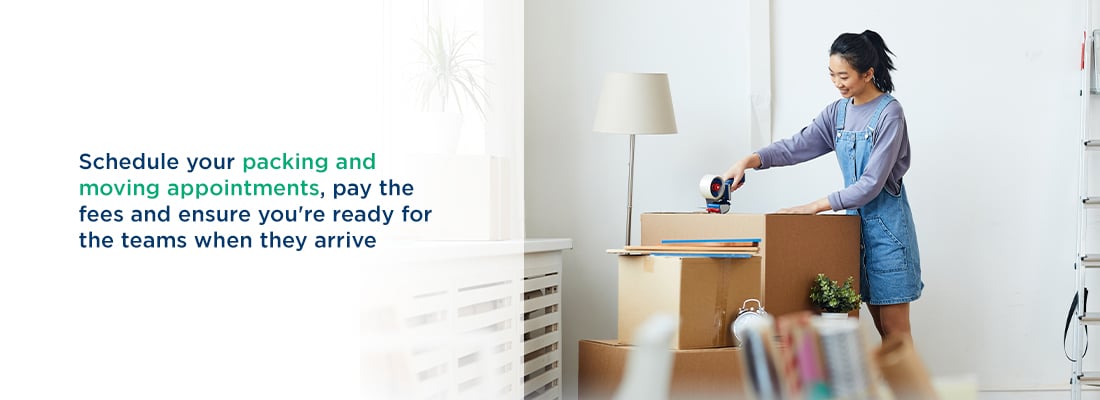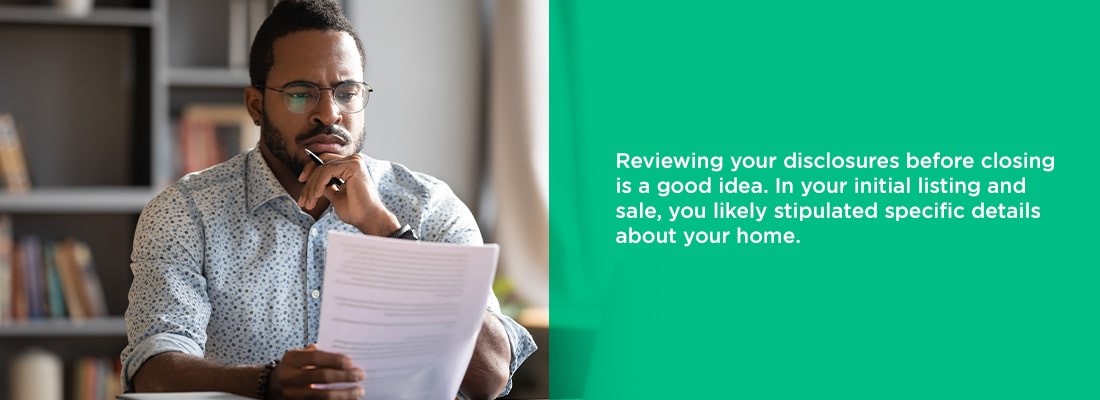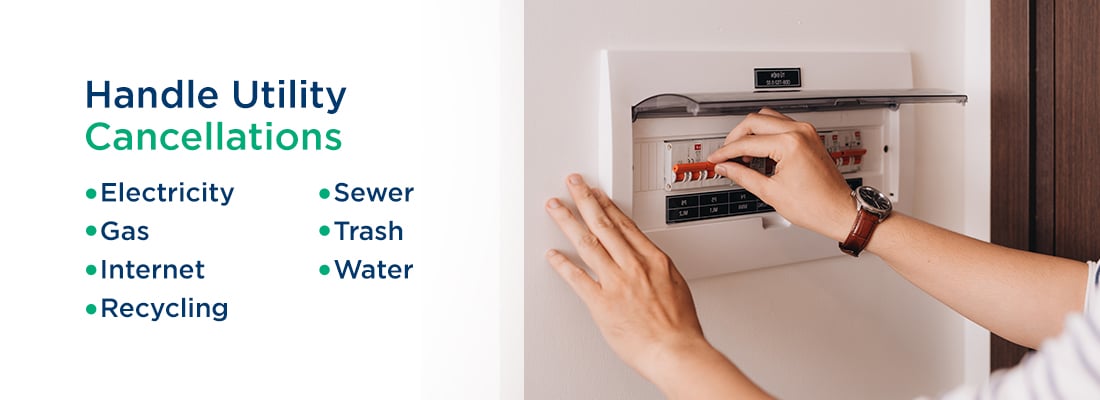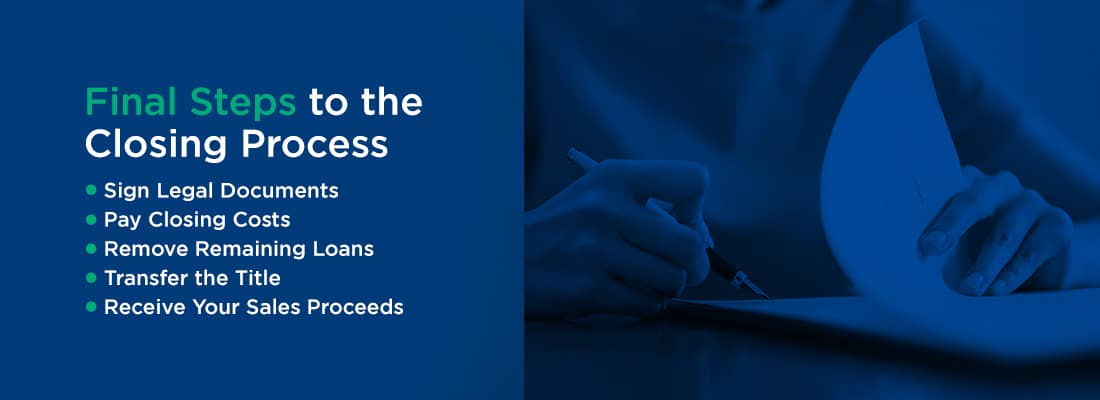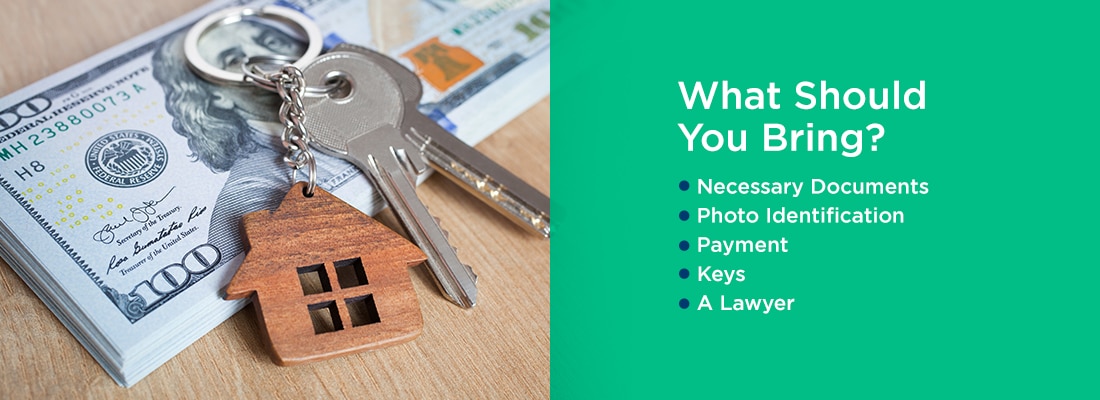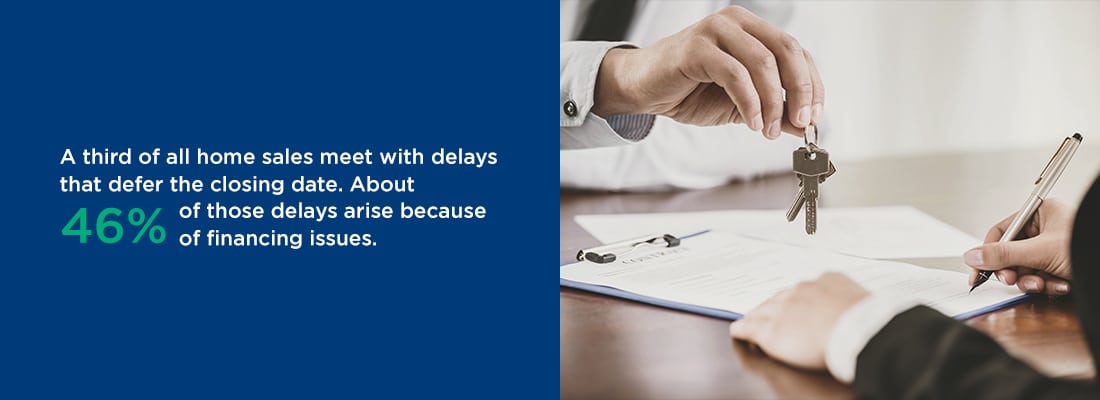Selling your current home to move on to bigger and better things is an exciting milestone for many homeowners. Though you’ll miss the house that gave you so many cherished memories, you can look forward to more exciting adventures that await down the road.
However, as you approach your closing date, it’s natural to have questions about what will happen, both in the days leading up to closing and on the big day itself. The guide below will provide some tips on preparing your home and discuss the closing process in detail, so you’ll know more about what to expect on closing day.
Table of Contents
- How to Prepare for Closing Day
- Final Steps
- What Should You Bring?
- FAQs About Closing
- Apply for a Mortgage
How You Can Prepare for Closing Day
Once you’ve accepted an offer on your house, you may feel as if your process is nearly over. But closing is a considerable undertaking, one you’ll want to prepare for carefully. You’ll have a lot of work to do before you’re ready to sign the paperwork and hand over your keys.
What can you expect on closing day? Here are a few of the steps you’ll likely need to take.
1. Pack up Your Home
On closing day, one of the first things you should do is pack for your move, if you haven’t already. Depending on how long you’ve been in your current house and how many possessions you’ve accumulated, boxing everything up may be a Herculean task.
If you know you have much more to pack than you can accomplish in a single day, plan to begin the process early. Maybe you can get a head start on putting everything into boxes and disassembling some of your larger pieces of furniture at the beginning of the week. Then, when your closing day gets closer, you’ll be able to move your belongings into a U-Haul or moving van more quickly.
If you plan to hire packers and movers, you should start arranging those logistics early as well — ideally, several days before your closing date so you can have your house emptied by closing.
Schedule your packing and moving appointments, pay the fees and ensure you’re ready for the teams when they arrive. Have clear instructions prepared for how you’d like your rooms boxed up, and have your belongings packed and ready to go once the movers get there. And in all the chaos of preparing to close, remember to have extra cash on hand as well. If you’re so inclined, so you can tip the pros for their services.
2. Review Your Disclosures
Reviewing your disclosures before closing is a good idea as well. In your initial listing and sale, you likely stipulated specific details about your home. For instance, you may have detailed which implements and appliances, like garden hoses and refrigerators, would stay with the house and which you would take with you.
On your closing date, review this list and check that you’ve abided by your initial agreement. The other parties will be reviewing the list as well, and you don’t want to shortchange them by taking items you agreed to leave.
3. Clean Your Home
Should a seller clean the house before closing? Though it’s not legally part of the transaction, it’s a considerate thing to do. Just as you’ll want your new home to be clean and shiny once you’re ready to move in, you should also leave your old home pristine for the new owner.
When you’re cleaning, remember to check tasks like these off your list:
- Removing posters and artwork
- Spackling nail holes
- Sweeping
- Mopping
- Dusting
- Wiping down countertops and baseboards
- Scouring bathrooms
- Scrubbing mirrors
- Cleaning windows, inside and out
- Tidying the garage
- Mowing lawns
- Hauling away trash
At the end of a long, mentally exhausting selling process, a long list of cleaning duties may seem daunting. Remember, though, that when you close on your new house, you’ll be grateful that another kind soul performed these same tasks for you.
4. Leave a Blank Canvas
Cleaning and readying your home for the new owner also involves emptying your home of extraneous items — unless you agreed in your disclosures that you would leave them.
That broken bathroom shelf you don’t want to make time to haul to the dump? Find a way to dispose of it somehow. The old lawnmower that technically still runs but you haven’t used in years? Though it’s easy to convince yourself the new homeowner might get some use out of it, it’s generally considerate to dispose of it and let the new owners fill the house as they please.
You also don’t want to leave the new owner with any repair headaches to deal with. In your initial agreements, you likely hammered out the specifics of any repairs and painting you would complete before closing. Be sure to check those tasks off your list, so you can leave the new owners a spruced-up and move-in-ready house.
5. Handle Utility Cancellations
If you haven’t done so already, cancel the utilities for your home on your closing day. Remember to include the following services, as applicable:
- Electricity
- Gas
- Internet
- Recycling
- Sewer
- Trash
- Water
As a courtesy, you may want to arrange to have your utilities canceled after closing so the new owner has a grace period to set up new accounts. And if you cancel your trash pickup before you’ve finished cleaning, be sure to remove all extra trash from the property yourself before closing.
Final Steps to the Closing Process
On closing day, after you’ve completed all the tasks above, you’ll finally be ready to take the last steps in selling your home.
1. Sign Legal Documents
On closing day, you and the buyer will sign various legal documents. You may need to sign a settlement statement, the deed and transfer documents and any other legal paperwork required to complete the sale.
The amount of paperwork you’ll need to go through at closing can seem daunting — 50 to 100 pages of paperwork is not uncommon. Faced with that much reading material, you may feel tempted to skim over the denser sections. We strongly advise you to resist this impulse. If there are any mistakes in your paperwork, you’ll need to get them ironed out before you sign, so they don’t cause you difficulties afterward.
You won’t be alone in going through your paperwork and signing the obligatory legal documents. Your real estate agent will be there to help you navigate the legal jargon and talk you through any thorny points you encounter.
Many people wonder how long it takes to close on a house once the day finally arrives. Because there’s generally so much paperwork to get through, you probably won’t be able to complete closing in a tight window — on your lunch break from work, for instance. It could take a couple of hours in some cases. However, if you choose to work with Assurance Financial our digital E-Closing experience allows you to sign most of your documents before you get to the closing table, significantly cutting down time the day of closing.
2. Pay Closing Costs
Once you and your buyer have completed all the signing, you will pay costs. These are any costs you owe to third parties for expenses related to your home’s sale. The appraisal fee, attorney fees and other outstanding bills are likely to form part of the closing fees.
How much can you expect to pay in closing fees once you reach that point? On average, total closing fees add up to about 2 to 7% of the home’s value. However, as the seller, you’ll likely be paying lower closing costs than the buyer will. Buyers often pay about 3 to 4% of the home’s value in closing costs, while sellers pay between 1 and 3%. While both sides must pay fees to people like their lawyers and real estate agents, the buyer incurs additional costs like inspection and appraisal charges.
Additionally, one of the parties sometimes offers to pay closing costs for the other. During negotiations, to obtain an otherwise more favorable deal, you may have agreed to pay the buyer’s closing costs, or the buyer may have consented to pay yours. In some cases, you may not need to pay any closing fees. Or, you may be responsible for both sets of fees if that’s the deal you agreed to in advance.
3. Remove Remaining Loans
If you still have a mortgage on your home, you’ll have it removed once you’ve completed all payments and deposits. Generally, the title insurance company pays off your mortgage lender and any other lienholders you may have.
4. Transfer the Title
After closing, you’ll also hand over the title to your property and the keys to your home. If you and the buyer have a joint closing, the buyer can take those items right then. If you’re closing separately, you can give the title and keys to one of the agents present.
5. Receive Your Sales Proceeds
You may not receive your sales proceeds on your closing day. You may get them a few days later, or you may have to wait for the relevant financial institutions to sort out the transactions. If your proceeds come in on closing day, you’ll be that much further on your way to whatever comes next.
What Should You Bring?
On closing day, bring the following items to your appointment.
1. Necessary Documents
At the closing, you may meet with your real estate agent, mortgage loan officer and a representative from the title company. You’ll need to bring along any outstanding paperwork.
The most critical piece of paperwork to bring to closing is your home’s title. The title is the document through which you’ll transfer your home’s ownership from you to the buyer.
2. Photo Identification
You’ll also need to bring a valid photo ID like a passport or driver’s license to closing to verify your identity. Because selling a home involves such monumental transactions, this requirement helps protect you from fraud.
3. Payment
Even though you’re selling rather than buying, you’ll still have closing costs to pay. If these costs are substantial enough, you may need to bring a cashier’s check instead of using a conventional check or credit card. Get with your Realtor and lender on the payment amount.
4. Keys
It’s easy to get so caught up in paperwork that you forget to bring your keys to closing. Be sure to bring them, though — that way, you can hand them over and finalize the transaction.
5. A Lawyer
Though you don’t necessarily need to bring a lawyer to your closing, you can if you want to. You may choose to have a lawyer present if you’d like additional assistance in going over the documents and navigating the day’s proceedings. You might also call in your lawyer if the terms of the sale are particularly complicated.
Frequently Asked Questions About Closing on a Home
Below are a few other common questions about closing on a home as the seller.
1. What Is Closing Day?
Closing day is the day you fulfill your sales contract and formally transfer ownership of your house to the new buyer. At the end of this process, though, you’ll be well on your way toward the next stage of your homeownership journey — getting ready to buy or move into a new home.
2. How Do You Determine When Closing Day Will Be?
Generally, you’ll know several weeks in advance when your closing day will be. During the sale’s contract negotiation phase, you and the buyer will set a mutually agreeable closing date. This date will then appear on the purchase agreement contract after you accept the offer. It will become the date by which you strive to complete all intermediate tasks like appraisal, inspection and walk-through if the buyer chooses to proceed with them.
3. Where Does Closing Take Place?
Closing usually takes place at the offices of the escrowee, or the entity that holds your funds before the transaction. Usually, though not always, the escrowee is the title insurance company, the entity that secures your legal ownership of your home.
4. Who Will Be Present at the Closing?
Generally, you can expect some or all of these agents to be present at the closing:
- A title company representative
- The mortgage lender
- Your real estate agent
- The buyer’s real estate agent
- The closing or escrow agent
- Your attorney, or the buyer’s attorney, if either or both or you choose to bring one
As the seller, though, you don’t necessarily need to be present at the buyer’s closing as long as you sign the deed and transfer documents ahead of time. Some sellers choose to be present to discuss any relevant details about the house. To minimize scheduling conflicts and avoid intruding on discussions of the buyer’s finances, many sellers opt for separate closings.
5. How Long Will You Wait Between Accepting an Offer and Closing?
You’ll likely wait several weeks between accepting an offer and officially closing the sale. In 2018, for instance, the average wait between the sale and closing was 43 days.
The delay occurs for a good reason — it protects you and the buyer by giving you time to hammer out logistics, ensure the necessary financial frameworks are in place and make sure the house is in good repair. The extended timeline also benefits the lenders and title brokers involved in the sale — they need time to get the paperwork together and make the deal legally sound.
Be aware, though, that delays are common in the period between the sale and the closing. According to the National Association of Realtors, a third of all home sales meet with delays that defer the closing date. About 46% of those delays arise because of financing issues. Appraisal and inspection concerns account for many of the other postponements.
6. What Can You Expect in the Final Week Before Closing?
Many homeowners wonder what to expect one week before closing. The sheer number of tasks to accomplish in the run-up can lead to uncertainty, and knowing what will likely happen in the final days helps you feel more prepared and confident.
As a general rule, in the week leading up to closing, it’s smart to create a closing checklist. You can write the list down, print it out or merely keep it readily accessible on your phone. Using a list to keep track of what you need to do before closing helps you make sure you remember everything amid the stress and excitement of getting ready.
Below are a few specific activities you can expect to take place before closing.
- Inspection: At some point in the escrow period, the buyer will likely have had a professional complete a home inspection. The inspector will have notified you and the buyer of any significant structural or safety issues and what you need to do to address them. If the buyer chooses to have an inspection and has not yet arranged it, you’ll need to prepare for that to occur in the final week before closing.
- Appraisal: You’ll also need to prepare to receive a professional appraiser at your home. This appointment will likely be separate from the inspection. The appraisal benefits you indirectly because it allows the buyer to receive the funds to purchase your house.
- Walk-through: In the final days before closing, you should prepare for the buyer to perform a final walk-through. The final walk-through is the buyer’s last chance to ensure that the house is structurally sound and its condition hasn’t changed since the buyer last saw it. During the walk-through, the buyer may inspect everything, including major appliances, doors, windows and light fixtures. The buyer will probably also have the original contract in hand and will want to confirm that the home’s original agreed-upon condition matches its actual status. The buyer will want your home to be empty or nearly empty, so you should prepare for the possibility that the walk-through will take place as late as the closing day itself.
- Packing and cleaning needs: As we’ve discussed above, you’ll want to get a head start on packing, cleaning and arranging moving logistics in the days before your official closing. Leaving yourself some breathing room provides some cushion in case of an emergency.
- Closing disclosures: The law requires you and the buyer to receive a document titled Closing Disclosures at least three days before the official closing date. You will receive these documents from your real estate agent. The Closing Disclosures list all the sale’s final terms and describe in detail who pays which closing costs. Double-check the details and make sure the terms are what you’d expected. If not, contact your real estate agent right away to find out why.
In general, keeping in touch with your team throughout the final week before closing is an excellent idea. By touching base with your real estate agent, mortgage officer, title insurance agent and any other relevant professionals, you can ensure your documents are in order and you’ve completed all requirements. The more thoroughly you prepare, the more peace of mind you’ll have that you won’t meet with any surprises on closing day.
It’s a Good Time to Contact Assurance Financial to Apply for a Mortgage
Now that you know what to expect on closing day on a house, you’ll be able to get ready for your closing and whatever new adventures come next.
And when it’s time to purchase another home, let Assurance Financial help you with your mortgage application. We make it easy to apply for a mortgage and estimate costs simultaneously, and our licensed loan officers have the knowledge and experience to get you attractive, custom competitive rates. You can get prequalified in 15 minutes and apply for a wide range of loans, from conventional loans to VA loans to FHA loans, among many others.
Apply for a loan online, or contact us to learn more about getting started with a mortgage.
Sources:
- https://www.realtor.com/advice/buy/reduce-closing-costs/
- https://static.elliemae.com/pdf/origination-insight-reports/Ellie_Mae_OIR_MAY2018.pdf(4)
- https://magazine.realtor/daily-news/2016/01/21/one-third-deals-face-closing-delays
- https://assurancemortgage.com/purchase-your-home/
- https://assurancemortgage.com/apply/
- https://assurancemortgage.com/contact-us/


